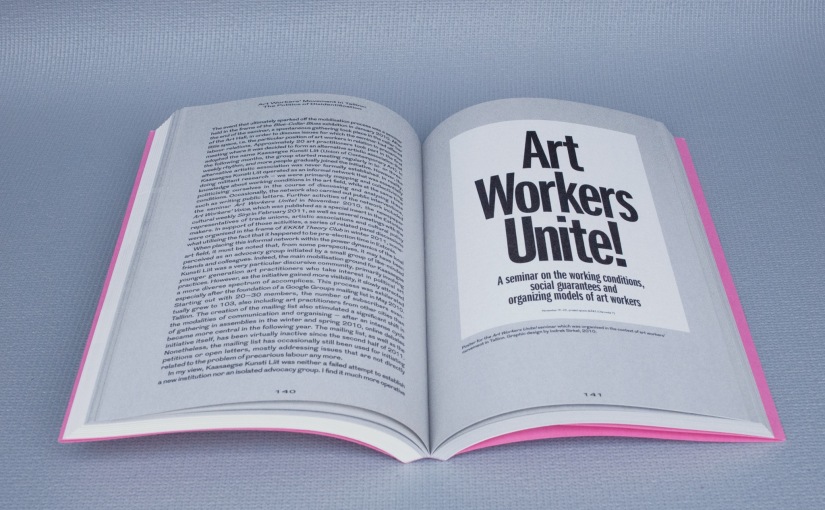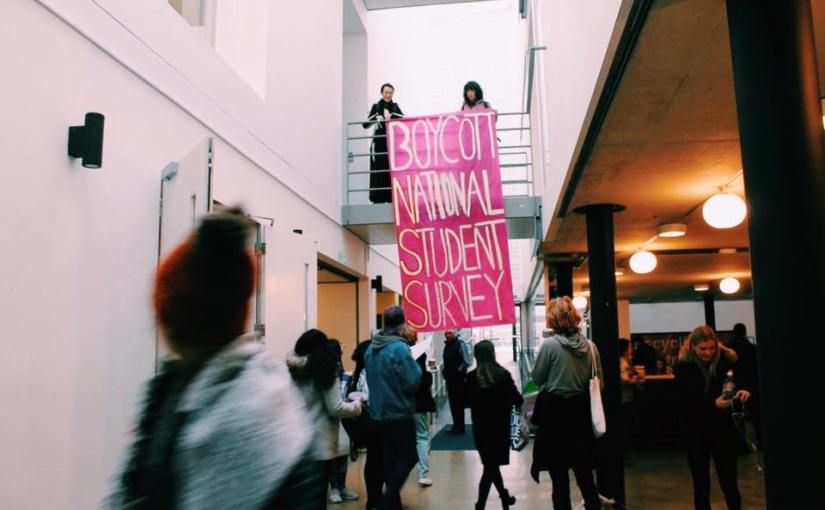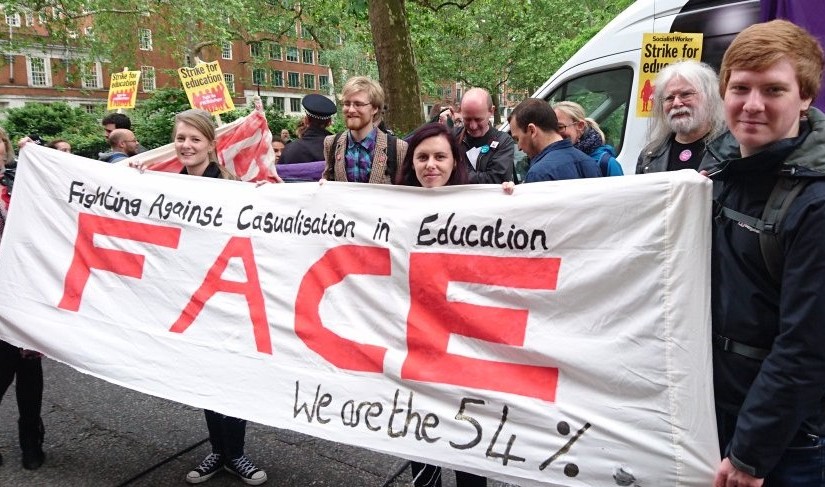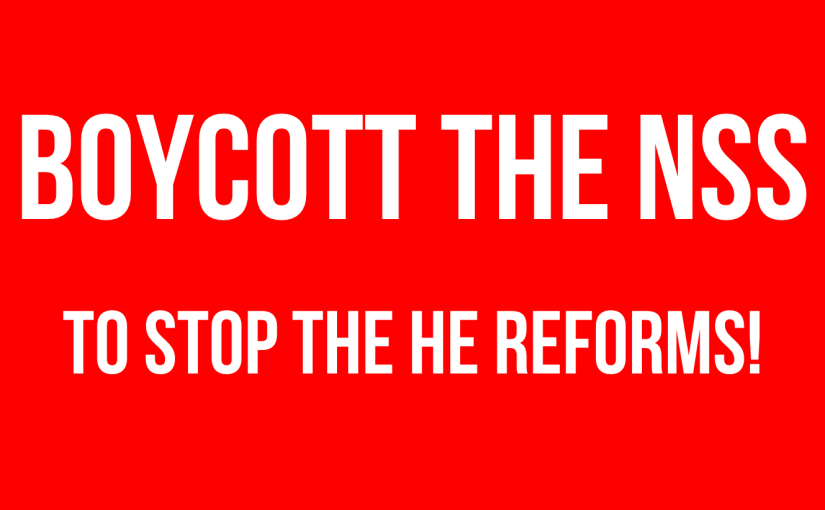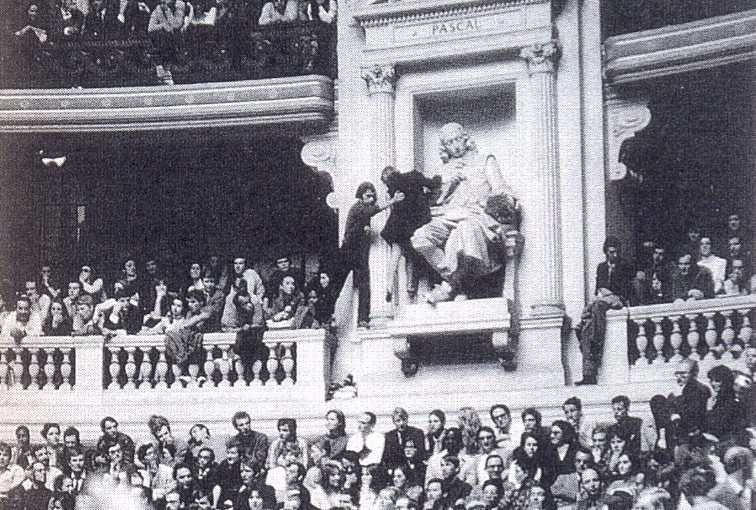For a political language to exist and be striking, it has to have some relation to proposed actions
John Berger
Academics aren’t all a bunch of radical lefties. But quite a few are. Dotted around the arts, humanities, social sciences and STEM, there are many who locate themselves in the wide, open space that is to the left of The Guardian. Yet, despite this relative density, contrary to the mythology of right-wing culture warriors, the University is a hotbed of neoliberal activity. Put bluntly, academics haven’t mounted any serious resistance within their institutions to cuts, to the commodification of research, to the consumerisation of education or to the bizarre quasi-Stalinist system of market discipline meets high-handed state intervention. This culture of complicity, a product of fear as much as acquiescence, is something casualised members of staff are acutely aware of. Vividly confronted by rampant managerialism and marketisation, it is this academic ‘community’ that notes most the absence of any institutional counterweight to their lot.
Thus when an initiative like the Alternative White Paper For Higher Education, In Defence of Public Higher Education: Knowledge for a Successful Society is put together, an alternative to current HE orthodoxy, casuals are prone to sit up and take note (if not overburdened by more immediate needs). Is another University possible? Alas the Alternative White Paper comes up a good way short in this regard. An unfair charge maybe, particularly given the paucity of genuine reasoned alternatives to the HE status quo and the much that is good about the Paper. But unless the Alternative White Paper’s major lacuna–we need to talk about agency–is addressed, then casuals’ material lessons about the University’s relations of production will continue to go unfused with the policy wonkery of the Alternative White Paper.
Silent Staffrooms
Academics are on the whole a supine lot. In the byzantine committee-based ecology of our most prestigious seats of learning, lecturers, readers and professors more or less comply with the letter and the spirit of this Government’s ideological priorities. Casualised staff note this all too clearly. Academic ‘leadership’, top or middle, has done little to address the precarious labour model found in our HE factories: 9-month contracts and zero-hour living are too often seen as lessons in character building, an unfortunate result of the shortage (never the distribution!) of precious resources. The idea that, instead of merely signing letters to The Guardian or Times Higher, you locally lobby and organise around material, relations of production issues like casualisation, alongside students and academic-related staff, is sadly far too vulgar and radical for a great many of our open-ended contracted colleagues. The micro level of power–the tacit, rigid internal doxa of quite a number of academic departments–is to be left pretty much to its own devices. Voting for the Greens or Remain, the occasional cosy, incestuous, bland tweet about how just nice students are, being on a panel whose title contains the word ‘radical’: more than enough.
It is this state of affairs that is arguably at its most telling when it comes to generating an effective campus politics. Yes, academics get that Tory policy in the form of the White Paper (WP), Success as a Knowledge Economy: Teaching Excellence, Social Mobility and Student Choice, the 2016 Higher Education Bill, and the incoming Teaching Excellence Framework (TEF) is to be instinctively opposed. However, what is to done presently within our institutions as an alternative surely needs a look in, too. To moan about reform, to have a right good whinge over a glass of moderately priced vino, without contemplating what to build instead is liable to fall back on private, individual righteousness (me against the philistines) and to indulge in Nimbyism. To quote William Davies, author of The Happiness Industry, ‘[b]lind modernization needs fighting with insightful modernization. Otherwise, ‘we’ are left simply trying to erect blue plaques in remembrance wherever possible, while ‘they’ rev up the bulldozers’.
Down with Current, Up with the New
Presumably it is this exciting task that is the mission statement of the Alternative White Paper (AWP). The document is a collective product of the Campaign for the Public University’s John Holmwood, UCU Left activists and others associated with such bodies as Council for the Defence of British Universities. The AWP calls for ‘a proper debate about the future of UK Higher Education’ (AWP, p. 4) as regards the Government’s latest reforms, currently (July 2016) being rushed through Parliament and the sector. While such rhetoric is hardly a tocsin–one can imagine the facile sentence ‘we need to have a conversation’ slotting right in here–the AWP makes clear its distance from the the status quo, quoting the Magna Charta Universitatum: ‘…its [the univeristy] research and teaching must be morally and intellectually independent of all political authority’ (AWP, p. 34). Holmwood, et al challenge at every turn the values and rationale behind current mainstream HE policy as embodied in the WP, its derivative legislation and sector architecture.
For instance, the AWP unpicks the supposedly link in the WP between the WP’s stated goals of greater access–‘[f]or the first time, all approved higher education providers will be required to demonstrate their commitment to widening participation and fair access’ (WP, p.57)–and markedly better teaching, and the actual consequences of the WP’s policy proposals. Take the regressive outcomes of the TEF. In order to boost the key TEF metric of student satisfaction, and thus gain official approval to raise their tuition fees, universities will prefer bland, comfort food teaching to the test, innovative pedagogy suffering as a result. In order to boost another TEF metric, employability, universities will be inclined to recruit those students, privileged, moneyed, who have an inbuilt social advantage when it comes to securing a glittering occupation (AWP, pp. 28-29).
The funding model of HE comes under direct attack in the AWP. Firstly, far from the state getting out of the university business as the libertarian talking points around the student ‘customer’ suggest, a government debt management regime exists, interfering and poking its nose in, to cover ‘the shortfall between annual outlay and annual repayments’ of student loans. This commitment, ‘close to £90bn’ (AWP, p. 9), means that the government has to have some means of controlling and securing repayment, hence TEF and its function of justifying the risk of fluctuating repayment rates through the employability metric. HE becomes a cunning fiscal wheeze to make good on the government’s outlay; students and educators are liabilities that need guaranteeing, not an investment bound to generate new, hitherto unrecognised social value. The funding of universities is to be governed by the extent to which individual institutions can guarantee repayments in the form of ensuring ‘good’ jobs for its post-students, while the true financial burden, the burden, for example, placed on students and teaching staff through universities’ fixation on investing in large capital projects to pull in the punters at the expense of investing in teaching labour, is sidelined.
By its very definition a HE market will consist of those staff and students lucky enough to be at a so-called ‘top’ university, and those who aren’t. If deregulations means a slew of providers ‘low scale, lower fee and low quality’ (AWP, p. 5), it is the debt-averse student who ultimately determines certain providers’ viability, not the virtues of a good state-sanctioned HE service. Moreover, universities, in being encouraged to focus on the short-term needs of an incoming generation of fee-paying customers, are subject to no countervailing tendency to root themselves in the local communities that support them: if London Met were to go bust, the effect would just not be contained or limited to those whose responsible, deserving (in the pure logic of the market) of its consequences. The externalities involved in such a law of the jungle are ignored.
There’s a ‘But’ Coming….Where the Casuals Come In
When compared, though, with its ugly WP twin, the AWP has a strategic silence. Unlike the WP with its commitment to the dynamic logic of the market–‘[c]ompetiton between providers in any market incentivises them to raise their game …Higher Education is no exception’ (WP, p. 8)–there is no comparable organisational insight in the AWP into the collective action, the campaign necessary to oppose and replace the Government’s, and its willing henchmen such as Universities UK and the Higher Education Policy Institute, policy platform.
If the ‘real’ WP is about creating a market that, in theory, will work of its accord, establishing and defining individual entities, properly costing and administering transactions between them, and then letting rip (albeit with regulators charged to intervene where there is market failure, for instance in the case of widening participation), then one might expect its alternative to sketch out the ‘other’ dynamic, one based on social solidarity and collective decision-making. Not so in the AWP. As a casualised member of staff, all too aware of what happens when the market is let rip, and when power resides with the buyers as opposed to the sellers of labour, the apolitical, slightly stand-offish nature of the AWP is marked: less ‘what is to be done’ and more ‘what someone could do but we haven’t really given a thought as to whom’.
Are the writers of the AWP crossing the fingers and hoping that Vice-Chancellor’s read and acknowledge ‘you have a point there’, or were they addressing themselves to the strategic challenges of mobilising university workers, core and periphery, around an alternative institutional university arrangements? I fear the former.
I don’t want to be too unfair to the AWP. Its constative value should be stressed (if not its performative). In it, Holmwood, et al argue for proper public accountability, accurate social costing as regards the value of higher education, and a UK state committed to stepping back and preserving academic freedom and curiosity-driven research. These together constitute a decent, humanist liberal democratic University, ‘open institutions that educate their students in the values of critical debate’ (AWP, p. 34), and that allow good scholarship to flourish. Holmwood, et al re-appropriate concepts Minister for Universities and the less dangerous Johnson brother, Joseph Edmund, sprinkles around in his ‘Foreword’ to the WP: ‘open democracy’; critical thinking; education for all ‘irrespective of their background’ (WP, pp. 5-6). Critically, for Holmwood, et al, the government’s further deregulation of HE, allowing private, for profit providers to enter the fray, competing for the student buck by cutting educational corners, diminishes the state’s regulatory capacity to provide a decent education for all, whatever nightwatchman power it still retains.
These virtues, as promoted by the AWP, are ones I am sure that are shared by anti-casualisation HE activists. The fact that teaching is held in less regard than research in the political economy of HE, and thus under-invested in–‘…increasing amounts of face-to-face teaching performed by junior academics on insecure contracts’ (AWP, p. 32)–assures the research ‘stars’ of today, meeting today’s late capitalist utilitarian needs, are entrenched at the expense of researchers of the future stuck in roles which offer no time for research. Instead of academics being viewed holistically, the quality of their research and teaching seen in the round, it is all reduced to one-sided quantitative indicators, the TEF being another prime example, which encourage careerist gaming and discourage curiosity-driven knowledge generation. In terms of positive academic freedom, the voice of staff on casual contracts is often marginalised in our universities in favour of managers and budget-holding members of permanent staff: why risk speaking up when the perceived target of that ‘criticism’ holds your job in their hands? The TEF, for all its claims that it will, to quote Jo Johnson ‘link the funding of teaching in higher education to quality (WP, p. 6), and ensure teaching will no longer be ‘the poor cousin of research’ (WP, p. 12), does not address the input problem, the contractual material status of staff who teach, and, rather, goes down the route of high-handed ‘bureaucratic monitoring’ (AWP, p. 32)
If the WP is so admirable in its diagnosis of our ills, why the criticism? Let me initially respond by way of an anecdote. When discussing with UCU colleagues from a nearby University an event around the WP precursor, the Green Paper, I ventured inviting Andrew McGettigan, he of The Great University Gamble, a shrewd analyst of HE’s current configuration and AWP contributor (AWP, p. 2). The response, sotto voice: ‘not those bloody PowerPoints again’. Months latter, listening to McGettigan at a UCU-organised set of presentations, listening to his quasi-Gradgrindian mantra about the importance of facts and knowing what’s what, that PowerPoint comment hit home, not out of data antipathy, but out of a longing for the language of action, of performance, of the urgency still to what is to be done, Lenin’s (or Chernyshevsky’s) urgent question.
The PowerPoint comment comes back again now, reading the AWP.
Policies; proposals; directives; strategic choices to be taken by associations of students and staff; the type of organisational demands and opportunities that a campus left needs to take; less isolated writing, more interconnected praxis: these are the organisational challenges that require careful deliberation. They are barely touched upon in the AWP. A sober assessment of the balance of forces on individual campuses; a political (not abstract macro-policy) deconstruction of the modern University; the delineating of the social trends and groups that can worked with to implement objectives; and a detailed account of the agents and agency needed for the reconstitution of HE (when the AWP states ‘[w]e need a proper debate’ [p.4] who is this ‘we’?): these are tasks which need actioning and accounting for.
Perhaps the only real list of firm policies in the AWP is in the academic governance section. It ends with a list of fairly solid proposals for increased non-managerial academic representation on academic boards, based presumably on the Scottish experience. Even here, though, this section seems to ignore ‘how?’. In the case of the WP, its authors, its backers, know the full spectrum of the WP has high politics, executive agency behind it, the consent of campus civil society be largely damned. This luxury, going back to the ‘collaboration’ points of my introductory remarks, is not afforded to academic counter-hegemonists. We need to sketch out our agents of change. We need to consider different groups of staff and students, the identities at play in the University, the makeup of campus civil society. Holmwood, et al may have better things to do than simulate Gramsci in his cell wrestling with practical conundrums of power and agency, but one would have thought they’d have at least given it a try. Academics aren’t fighting back: why is that?
Look at the language and ambition of the WP. ‘We will simplify the regulatory landscape’ (WP, p, 9); ‘…two specific, clear goals on widening participation’ (WP, p. 14); ‘Summary of decisions’ (WP, p. 18); ‘…have a power’ (WP, p. 66), ‘the creation of UKRI will act as a driver’ (WP, p. 79). Here is a no humble treatise. Here is a catalyst, firing off policy, arrogant yes in assuming that executive agencies know best and not acknowledging how contested its propositions are, but highly astute in drawing up a problem/crisis–alleged poor teaching and few incentives to improve it; a lack of competition equals complacency amongst former polytechnics; a need to finish the job of previous HE reforms–and looking to solve it though intervention and active governance. Here are proponents of neoliberal education diagnosing and strategising simultaneously.
The AWP, when it comes to such action-orientated plotting, is deficient therein. Its conclusion lacks any core demand. It highlights that academics are not innately wise dispensers of knowledge, that research is about sanctifying a method of collegial collaboration, that private imperatives are a threat to democratic epistemic endeavor. But the conclusion has no provisional plan to enact the democratic university, no identified agent and directive policies to do so.
Making a Difference, Making an Impact
Strikingly, the AWP ends on a depressing objective note: ‘[h]igher education is now fully dependent on political authority and economic power’ (AWP, p. 34). The subjective is silent. When Holmwood, et al say ‘[t]his Alternative White Paper aims to correct…imbalance’ (AWP, p. 4), it seems curious that the rebalancing is primarily transcendental than immanent; that is, the changes that the AWP alludes to–greater academic involvement and freedom, more state regulation of resource (…greater restraint…[AWP. p. 8]), developing ‘strong working relationships with community partners to ensure successful outreach work’ (AWP, p. 17)–are left to some higher power to make good. Despite skewering the Government’s formal commitment to social goods by showing the contradictory outcomes of their policies, Holmwood, et al don’t go further and suggest how is it that a we wins, how a we can position itself to bring about the beginnings of an alternative University.
To go back to the causal lot, as a peripheral members of the academic club, given access to the photocopy if we’re lucky, casualised members of staff could be that agent, marginalised but au fait, through their experience of the shop floor, with the lacunae of the modern University. Casualised staff, in other words, are well positioned to foster alliances with students, particularly postgraduate students, to release the untapped pool of potential amongst underinvested in, subordinate short-term casual staff, and are thankfully wise to the romantic, idealist elitist guff professors and senior staff sprout in promoting the idea of an ‘Aκαδήμεια’ set against the UK’s bureaucratic-authoritarian state.
The lack of discussion concerning UCU (or any other membership body) is indicative I feel. UCU is not the answer to everyone’s prayers in and of itself, but when it comes to collective action, unless the Council for the Defence of British Universities is about to kick off, it contains the core dynamic of an association of diverse academic actors coming to work together for a common purpose, the starting point for an alternative University. The WP has the Office for Students, TEF, research bodies, enthused civil servants and a wish to create a new HE architecture; according to the AWP, sans a union or mutual clubbing together, we only have a shallow, ill-defined ‘we’.
Now, the drafters of the AWP may contend they could do only so much, could go only so far. They had no brief for a edict-filled, peremptory manifesto, although for those Fighting Against Casualisation in Education activists attending the ‘founding’ meeting of the AWP, the Second Convention for Higher Education, it was clear that the AWP was intended to have some sort of popular, Convention-backed mandate. This is why some of us came. It was thus particularly jarring, not to say disappointing, to see how the nascent participatory animus resulting from an open meeting such as the Convention was used to give a seal of approval to a document Holmwood, et al had already effectively drafted. The Convention was, in effect, some sort of democratic cover. This was a wasted opportunity. The organisational imperative of an alternative University, hinted at at the Convention’s rhetoric, was neglected; the AWP is, to put a twist on a well-used phrase, an academic exercise, a revision/extension of Holmwood’s previous AWP. While it must give Holmwood, et al great comfort in being so right at least twice, this is somewhat of a small mercy compared with an honest assessment of how to mobilise and formulate academic private dissent into public counter-reformist zeal and concrete institutional political intent.
Conclusion
Laughably, it is sometimes said that the educated left have followed their master Gramsci’s advice and taken over the education of our youth, instead of the impossible task of convincing a national polity that they should vote left-wing leaders into office. Nothing, as casualised staff can testify, is furthest from actuality in our universities. In fact, we need to start such Gramscian maneuvering. The AWP, an excellent encapsulation of the sort of humanist, liberal University that an in denial Government spokespeople would claim that the Government is in principle for, does not set the scene adequately. It allows, by not asking the right questions, leftist academics to continue to burnish their weak countercultural credentials, evincing indignation, declaring an emotional affinity with the principles of the AWP, with all the force of a Facebook like. Holmwood, et al do not even venture to pose the fundamental questions: what are you going to do? And if you can’t, what can be done to get you and others to a place where you can. Those of us on the academic left who are reflexive about our work grasp the distance between the vision of education in the AWP and the notion of HE held by successive governments and successive generations of Heads of School, Deans and Senior Management Team is one thing; the issue is how to fight it. Candidly, we don’t need another white paper; we need a strategy. This is how we should be devoting what little time and resource we alt-academics have.
